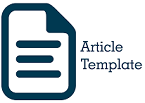BARACK OBAMA’S VICTORY SPEECHES THROUGH ILLOCUTIONARY ACT
Abstract
This research deals with the analysis of illocutionary act found in Barack Obama’s victory speeches. The purpose of this research was to analyze the illocutionary act which produced by Barack Obama in his victory speeches.This research used descriptive qualitative method where the researcher analyzed one by one the type of illocutionary act which produced by Barack Obama in his victory speeches. The researcher used the theory from Alston for illocutionary act. From the research, the researcher found that there were 31 statements of illocutionary act produced by Barack Obama in his victory speeches. They were 20 statements for expressive, 7 statements of directives and 4 statements of comissive. The researcher did not find any excertive in Barack Obama’s victory speeches. The result showed that the most dominant type of illocutionary act found in Barack Obama’s victory speeches was expressive.
Keywords
Full Text:
PDFReferences
Aitchison, J. (2003). Teach yourself. Hodder and Stoughton, Ltd.
Altson, W. P. (2000). Illocutionary acts and sentence meaning.Cornell University Press : United States of America.
Baok, L. F. S. B., Jayanti, I. G. A. S. R., & Santika, I. D. A. D. M. (2021). The analysis of illocutionary act in Hillary Clinton’s speech. Elysian Journal English Literature, Linguistic and Translation Studies, 1(2), 98-107.
Creswell, J.W., & Creswell, J.D. (2018). Qualitative, quantitative, and mixed methods approaches(5th ed). Sage Publication, Inc: California.
Hariati, P., Pulungan, A. H., &Husein, R. (2020). Illocutionary acts in Jack Ma’s inspiring speech in his graduation at the university of hongkong. Britain international of linguistics arts and education (BIoLAE) Journal, 2(1), 384–394.
Larasati, D., Arjulayana.,& Novita, S. C. (2020). An analysis of the illocutionary acts on Donald Trump’s presidential candidacy speech. An English-Indonesian Journal for English, Education, and Culture, 9(1), 7-14.
Leech, G. (2014). The pragmatics of politeness. Oxford University Press: New York.
Osisanwo, W. (2003). Introduction to Discourse Analysis and Pragmatics. Femolus-Fetop Publishers: Lagos.
Richards, J. C., & Schmidt,R. (2002).Longman Dictionary of Language Teaching and Applied Linguistics(3rded.). Ed.,Pearson Education Limited : Great Britain.
Saputro, E. P. N. (2015). The analysis of illocutionary acts of Jokowi’s speeches. Universitas Sanata Darma Yogyakarta.
DOI: https://doi.org/10.32502/ecj.v6i2.5181
Refbacks
- There are currently no refbacks.
Copyright (c) 2023 English Community Journal
The Departement of English Education, Faculty of Teacher Training and Education, Universitas Muhammadiyah Palembang
Jl. Jenderal A. Yani 13 Ulu, Seberang Ulu II, Palembang (30263), Indonesia.
Indexed by :
English Community Journal has been listed in :

English Community Journal by http://jurnal.um-palembang.ac.id/index.php/englishcommunity is licensed under a Creative Commons Attribution-ShareAlike 4.0 International License.







